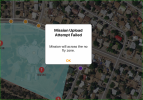The laws in my state (and in most states) says you are allowed to run a traffic control device that is not functioning correctly. As soon as you do that, you have to go back to obeying all the traffic laws on the next and subsequent encounters; it is temporary. You are not allowed to tamper with the traffic control device and you can only run it if it is safe to do so. These steps are available to all motorists, not just the ones who have a "hack." It isn't necessary to break to law at this point.
The flaw in your argument is that running a malfunctioning red light is not breaking a law. My analogy is that you're essentially "hacking" your way past the light by essentially disobeying it ONLY when it malfunctions. Don't get too hung up on the word "hack," as I use that word loosely for the purpose of the analogy.
Your hack is the violation of the agreement you have with DJI;
Which agreement is that? I have no agreement with any hardware I purchase, which includes far more dangerous hardware like a car or truck or motorcycle. I pay for the hardware and it is mine. My "contract" with said manufacturer is complete. My drones are no different.
I would honestly like to see this "agreement" you speak of. Interesting argument.
neither DJI not the FAA have given you permission to *bypass* anything that is not working correctly.
I don't need their permission any more than I need permission to modify the muffler system on car or motorcycle. If I'm in violation of noise ordinance, I can get a citation. If I'm in violation of airspace, I can receive a fine. But the act of modifying is not, in and of itself, against any laws.
Also...
The manufacturer may recommend against modifications and may even void your warranty. But, again, there are no laws against modifying my drone or my car.
Hacking likely violates some of the federal rules as well.
Well..."rules" is a slippery slope. To be clear, hacking doesn't violate any LAWS. Regarding modification of software and/or hardware, I would have to see these rules you speak of. At this point I'm 95% sure no such rules exist. But I concede I may be wrong. I'm open to viewing the nomenclature. As of this writing, I can find no evidence of the "hacking rules" you speak of.
It's like using a rogue traffic control device (as used by first responders) which is expressly prohibited by my state law (and in many other states).
That's an erroneous analogy. I'm not using the hack to change the lights. I'm using the hack to run the red light when it malfunctions. The key word being "malfunctions."
Your hack is permanent...
No, it is not. None of them are. I can update software and firmware any time I wish, thus negating any hacks I may have employed.
...and it goes way beyond alleviating a single inconvenient malfunction encounter.
I highly disagree. The hacks lay in the background, silent, waiting for a malfunction. These hacks come into play MAYBE a couple times a year. Again, it's only when LAANC MALFUNCTIONS that these hacks come into play. And one doesn't have to search too far to find MANY UAV pilots who have suffered at the hand of these permissions/LAANC/NFZ malfunctions. FWIW, these malfunctions are DJI's doing. So I fix (bypass) the DJI malfunctions.
You spoke of a contract with DJI. What about THEIR end? They sold me a drone under the guise that I could fly it anywhere I had permission to. Seems it is DJI who is in "violation" of our "contract."
If you find a way to use your original drone to legally bypass a malfunction....
In the industry, there is a word for "bypassing a malfunction." That word is "repair." I've never seen an "illegal repair" in ANY context.
...without hacking into the software then perhaps it might fly but you take steps that are not available to anyone else...
Correct.
because the laws don't apply to you.
Again, which laws would those be?
After your job is done, do you put the original software back into place?
No.
Do you bypass other safety systems and label them as inconvenient "malfunctions" because "they get in your way?"
Yes. I disable all of the Object Avoidance crap on all my drones. And sometimes I bypass the GPS lock by flying in ATTI mode (something I do quite often). But these are settings (options) within the software. So I guess I'm not "breaking any laws" in this regard...funny....
These safety laws are not based on mission success or project costs.
Again, which laws do you speak of? I seem to be asking this a lot. You keep referencing "laws" I've never heard of.
You're not just allowed to finish the mission no matter what. If there is a unforeseen TFR in place, do you still fly?
What exactly is an "unforeseen TFR???" LOL....there are only TFR's. They are never "unforeseen." Maybe YOU don't see them, but I always check for TFR's before flying.
In my city there is a two-week event called the Balloon Fiesta, which is a hot air balloon event. Within airspace they always have right of way, and there are many TFR's throughout the city. So for 2 weeks I just park my drones, even if work is outside the TFR. This should give you a feel for my safety paradigms.
Nothing stops by drone from taking off when a TFR is in place but when I see it, I ground myself.
As any good UAV pilot should. I couldn't agree more.
You don't need a hacked drone so when you have a mission planned and a TFR is in place, does the anarchist go ahead anyway?
Of course not. You're conflating. I was very specific that my hacks only come into place when there is an NFZ malfunction. Try as you may, I am NOT flying "illegal missions" willy nilly. As I pointed out already, I obey all laws. All rules. All regulations.
Good chat.
D












